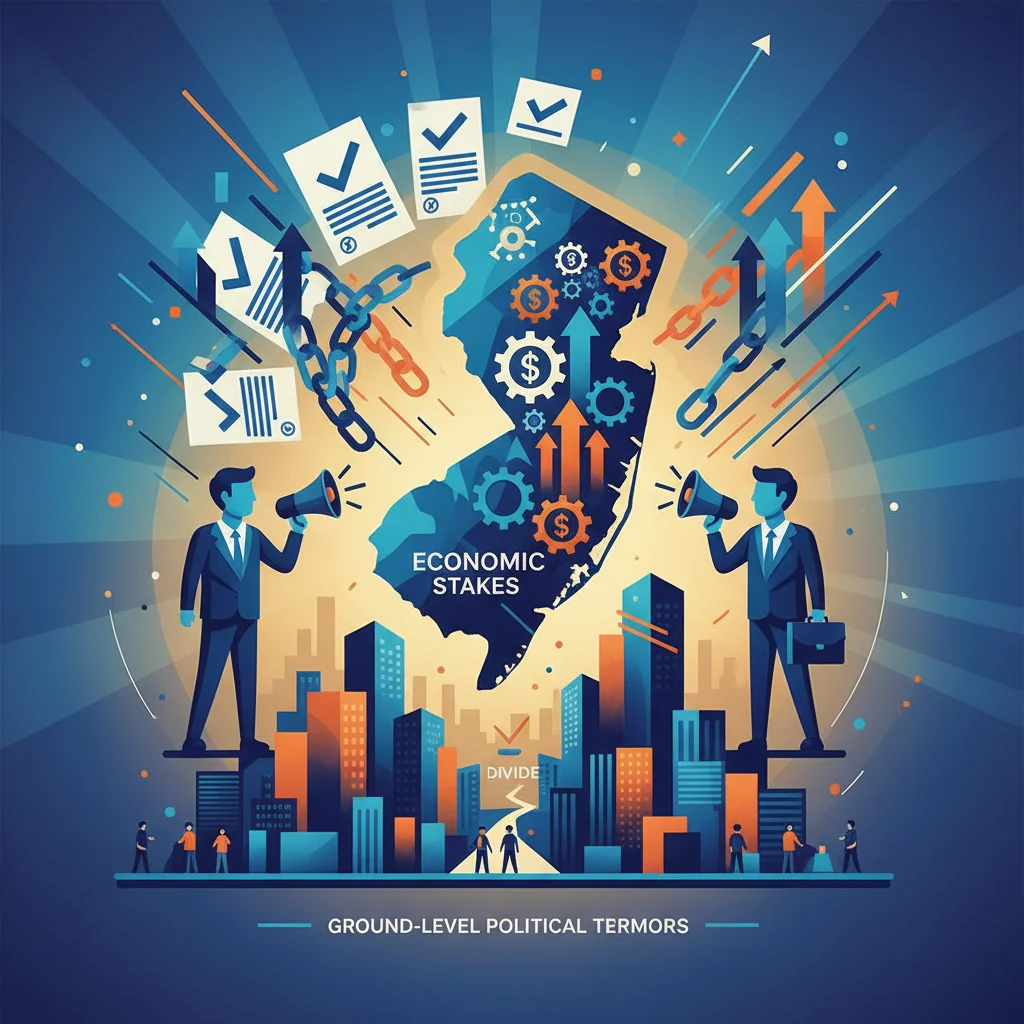
Beyond the Ballot: Decoding the Economic Stakes in New Jersey’s Populist Showdown
In the bustling corridors of power and finance, it’s easy to overlook the ground-level political tremors that signal larger seismic shifts in the American economy. The gubernatorial race in New Jersey, a contest seemingly fought over local issues like plastic bags and the proper name for a breakfast meat, offers a surprisingly clear window into the populist currents shaping national economic policy and investor sentiment. The battle between Democrat Mikie Sherrill and Republican Jack Ciattarelli is more than a regional political drama; it’s a microcosm of the broader economic debates defining America’s future, with significant implications for finance, investing, and business strategy.
At first glance, the race appears colored by the familiar hues of the national political landscape—Donald Trump’s lingering influence, cultural wedge issues, and passionate debates over state-level mandates. However, for investors, business leaders, and financial professionals, the real story lies beneath the surface. This election is a test case for competing economic philosophies in a high-stakes environment. New Jersey, a state with the highest property taxes in the nation and a complex economy that is home to both immense wealth and significant inequality, serves as a crucial laboratory for policies that could soon play out on the national stage.
This post will dissect the New Jersey gubernatorial race through an economic lens, exploring how the candidates’ platforms could impact key sectors, influence the state’s investment climate, and serve as a bellwether for the broader U.S. economy.
The Economic Battlefield: Understanding New Jersey’s Unique Landscape
To appreciate the weight of this election, one must first understand New Jersey’s complex economic identity. It’s a state of contrasts. It boasts a median household income among the highest in the U.S., driven by its powerful pharmaceutical, life sciences, and financial technology sectors, and its proximity to the economic engines of New York City and Philadelphia. This concentration of wealth and industry makes it a powerhouse. Yet, it’s also a state grappling with a notoriously high cost of living, significant public pension liabilities, and a tax burden that many residents and businesses find suffocating.
This environment creates a fertile ground for populist messaging that resonates with voters feeling the squeeze. Issues that seem trivial to outsiders—like the state’s ban on single-use plastic bags—are reframed by candidates as symbols of government overreach and its impact on the everyday cost of living. For Ciattarelli, repealing the ban is a populist rallying cry for deregulation and individual freedom. For Sherrill, it’s a defense of forward-thinking environmental policy. The economic undercurrent, however, is about the role and scope of government in the market—a fundamental question with far-reaching consequences for every aspect of the economy, from Main Street businesses to Wall Street trading desks.
Argentina at the Crossroads: Will Milei's Economic Shock Therapy Survive the Vote?
A Tale of Two Economic Visions: Sherrill vs. Ciattarelli
The core of the race lies in the divergent economic strategies proposed by the two candidates. Their platforms represent two distinct paths for New Jersey’s future, each with its own set of risks and rewards for the state’s businesses and the broader investment community.
Below is a comparative analysis of their stances on key economic issues:
| Economic Issue | Mikie Sherrill (Democrat) | Jack Ciattarelli (Republican) | Potential Market & Economic Impact |
|---|---|---|---|
| Tax Policy | Advocates for targeted tax relief for the middle class and seniors, potentially funded by maintaining or increasing taxes on corporations and the highest earners. Aims to protect state revenue for public services. | Proposes broad-based tax cuts for both individuals and businesses to make the state more competitive. Pledges a comprehensive overhaul of the state’s tax code to stimulate growth. | Ciattarelli’s plan could boost corporate profits and attract business, potentially lifting the regional stock market. Sherrill’s approach may bolster consumer spending but could place a higher burden on corporations, affecting their bottom line. |
| Regulation & Business Climate | Supports environmental and consumer protection regulations (e.g., the plastic bag ban) as necessary for long-term sustainability and public welfare. | Views many state regulations as burdensome “red tape” that stifles economic activity. Vows to create a more “business-friendly” environment through aggressive deregulation. | A Sherrill victory could benefit green technology and ESG-focused investing sectors. A Ciattarelli win would likely favor traditional industries, manufacturing, and small businesses sensitive to compliance costs. |
| State Budget & Spending | Prioritizes state investment in education, infrastructure, and healthcare as drivers of long-term economic growth and stability. | Emphasizes fiscal conservatism, promising to cut “wasteful” spending and reduce the size of state government to address New Jersey’s long-term debt and pension obligations. | Fiscal discipline under Ciattarelli could improve the state’s bond ratings but might lead to austerity measures. Sherrill’s spending priorities could stimulate specific sectors but may add to the state’s fiscal pressures. |
The choice for voters, and the implication for investors, is clear. It’s a classic debate between a demand-side approach that prioritizes public investment and a robust social safety net versus a supply-side strategy focused on tax cuts and deregulation to unleash private sector growth. The outcome will directly influence the profitability of companies operating in New Jersey and the attractiveness of the state for future capital investment.
Populism’s Ripple Effect on Financial Markets and Technology
The populist rhetoric in this race isn’t just political theater; it’s a reflection of a deeper public sentiment that has tangible effects on the financial world. The “us vs. them” narrative, which pits everyday citizens against perceived elites and powerful institutions, often includes the traditional banking and finance sectors as targets. This undercurrent of distrust is a powerful force that can shape policy and accelerate disruptive trends.
For example, the widespread frustration with economic inequality and the feeling that the system is “rigged” is a significant tailwind for the fintech revolution. When people lose faith in established financial institutions, they become more open to alternatives. This environment fosters innovation in areas like decentralized finance (DeFi), peer-to-peer lending, and digital payment platforms that promise greater transparency and accessibility. A political climate charged with populism can inadvertently accelerate the adoption of new financial technology.
Moreover, the debate over government control, symbolized by the plastic bag ban, echoes in the world of digital currencies and blockchain. The appeal of assets like Bitcoin often stems from their decentralized nature and independence from government and central bank control. While neither candidate is campaigning on a crypto platform, the anti-establishment energy they tap into is the same energy that fuels interest in alternative financial ecosystems. As one voter noted, the feeling is that “the government is in every little part of our lives,” a sentiment that drives a search for autonomy in both the political and financial spheres (source).
Geely's UK Gambit: Why a 100,000-Car Target is a Major Signal for the Global Economy
Actionable Insights for Investors and Business Leaders
Navigating this politically charged economic environment requires a nuanced approach. The outcome of the New Jersey election, and others like it, will create clear winners and losers across various sectors.
- Monitor Sector-Specific Regulatory Risk: A Democratic victory could signal continued or expanded environmental regulations, impacting energy and manufacturing sectors but creating opportunities in green tech and sustainable businesses. A Republican win would likely reverse this trend, benefiting traditional industries but potentially creating uncertainty for those invested in the green economy.
- Re-evaluate State and Local Tax Exposure: Businesses with a significant footprint in New Jersey must model the potential impact of wildly different tax philosophies. A Ciattarelli administration could significantly lower the corporate tax burden, while a Sherrill administration might maintain the status quo or seek increases to fund programs. This has direct implications for corporate earnings and equity valuations.
- Factor Political Polarization into Risk Models: The tight, contentious nature of this race highlights the growing political polarization across the U.S. This translates into policy volatility. Long-term investing strategies must increasingly account for the risk of sharp policy reversals every election cycle. Diversification and hedging against political risk are more critical than ever.
The lessons from New Jersey are a powerful reminder that state-level economics are inextricably linked to the national financial landscape. What happens in Trenton has ripple effects that reach far beyond the Delaware Water Gap.
Birmingham's 'Zone 5' Gambit: How HS2 is Rewriting the UK's Investment Map
Conclusion: A Bellwether for America’s Economic Soul
The New Jersey gubernatorial race is far more than a local contest about Taylor ham or pork roll. It is a crucial bellwether for the economic direction of the country. It encapsulates the central tension of our time: a desire for economic security and relief from the rising cost of living, set against a backdrop of deep political and cultural division. The candidates’ populist appeals are a direct response to these anxieties.
For the financial community, the key is to look past the political noise and analyze the fundamental economic principles at stake. The election’s outcome will provide valuable data on voter priorities, the future of tax and regulatory policy, and the enduring power of populism in shaping the American economy. Whether New Jersey opts for a path of progressive investment or conservative deregulation, the decision will echo in corporate boardrooms, on trading floors, and in the portfolios of investors nationwide.


